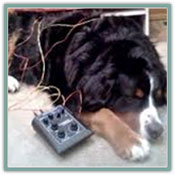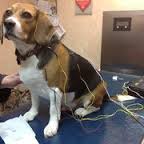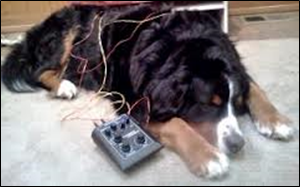
“Our pets have an extraordinary effect our lives.”
Acupuncture Team Member
Veterinarians
Tina Ting, DVM, CVA
Jacqueline Carver, CVA, DACVSA
 Acupuncture is the practice of inserting needles in to certain points on the body. These points are highly specific and have designated locations that can be found by palpating depressions or very fine divots in the underlying subcutaneous or muscular tissues or by detecting them based on precise anatomic landmarks. The acupuncture points typically lie within meridians, which are energy channels in the body. Each meridian typically corresponds to certain body systems in Chinese medicine, which are in turn translated in to usage with western medicine. Acupuncture points vary tremendously and are determined based on a patient’s ailment, personality, and ease of access to the points.
Acupuncture is the practice of inserting needles in to certain points on the body. These points are highly specific and have designated locations that can be found by palpating depressions or very fine divots in the underlying subcutaneous or muscular tissues or by detecting them based on precise anatomic landmarks. The acupuncture points typically lie within meridians, which are energy channels in the body. Each meridian typically corresponds to certain body systems in Chinese medicine, which are in turn translated in to usage with western medicine. Acupuncture points vary tremendously and are determined based on a patient’s ailment, personality, and ease of access to the points.
Acupuncture has been shown to affect all major physiologic systems. It acts primarily on the central nervous system, but it also affects the musculoskeletal, hormonal, and cardiovascular systems. As a result, acupuncture does more than just relieve pain. It also increases circulation, causes a release of many neurotransmitters and endorphins, relieves muscle spasms, stimulates nerves, and stimulates the immune system. In traditional Chinese medicine theory, diseases are caused by an imbalance of energy in the body. Acupuncture therapy is based on bringing energy back in balance, correcting the flow of energy, and thereby healing the patient.
 Acupuncture is performed with sterile, single use needles of varying lengths and gauges depending on the size of the patient and the location of the chosen points. There are different techniques that can be employed to achieve the greatest level of success. Common techniques include: dry needle, electroacupuncture, and aquapuncture. Dry needle is the insertion of needles by themselves. Electroacupuncture is the attachment of electrical leads to certain acupuncture needles to stimulate the points at varying intensities and frequencies. Aquapuncture is the injection of acupuncture points with liquid solutions (typically saline, diluted vitamin B12, or Adequan). With needle acupuncture, typically 15-40 needles are used per patient. The needles are left in for 10-20 minutes. An entire session usually lasts approximately 45 minutes. Owners are encouraged to remain in the treatment rooms with their pets.
Acupuncture is performed with sterile, single use needles of varying lengths and gauges depending on the size of the patient and the location of the chosen points. There are different techniques that can be employed to achieve the greatest level of success. Common techniques include: dry needle, electroacupuncture, and aquapuncture. Dry needle is the insertion of needles by themselves. Electroacupuncture is the attachment of electrical leads to certain acupuncture needles to stimulate the points at varying intensities and frequencies. Aquapuncture is the injection of acupuncture points with liquid solutions (typically saline, diluted vitamin B12, or Adequan). With needle acupuncture, typically 15-40 needles are used per patient. The needles are left in for 10-20 minutes. An entire session usually lasts approximately 45 minutes. Owners are encouraged to remain in the treatment rooms with their pets.
 The frequency of acupuncture treatments varies based on the problem that is being treated. Minor injuries may require as few as 1-3 sessions. Other problems such as IVDD, degenerative joint disease, or chronic metabolic problems usually require 1-3 treatments per week for 4-6 weeks. Clients are advised to allow a minimum of 3-4 sessions before they will see significant improvement, although many pets experience improvement after only a single treatment. Once the ailment is controlled, maintenance treatments are recommended and tapered to allow the greatest amount of symptom free time in between sessions. Acupuncture can also be used in post operative patients to assist with healing and pain. Acupuncture combined with Chinese herbal therapy can also be utilized as adjunctive therapy for other illnesses such as seizures, renal insufficiency, or gastrointestinal diseases.
The frequency of acupuncture treatments varies based on the problem that is being treated. Minor injuries may require as few as 1-3 sessions. Other problems such as IVDD, degenerative joint disease, or chronic metabolic problems usually require 1-3 treatments per week for 4-6 weeks. Clients are advised to allow a minimum of 3-4 sessions before they will see significant improvement, although many pets experience improvement after only a single treatment. Once the ailment is controlled, maintenance treatments are recommended and tapered to allow the greatest amount of symptom free time in between sessions. Acupuncture can also be used in post operative patients to assist with healing and pain. Acupuncture combined with Chinese herbal therapy can also be utilized as adjunctive therapy for other illnesses such as seizures, renal insufficiency, or gastrointestinal diseases.
Side effects from acupuncture are extremely rare. The most common side effect is that patients tend to be very fatigued and may sleep more for the first 1-2 days. Occasionally, some patients may also seem to worsen after the first day or two of treatment. If this occurs, the worsening period typically resolves and is followed by a period of recovery and improvement.
Upon referral, Dr. Ting will evaluate your pet and she will discuss a treatment plan to help restore them to their optimal quality of life. We will determine the most appropriate treatments and implement them in our state-of-the-art facility equipped with a full physical rehabilitation department that includes an underwater treadmill, electrical stimulation, therapeutic laser, and therapeutic exercise equipment. Additionally, pet owners will be instructed in techniques to reinforce these treatments at home and enhance their pet’s recovery. The Physical Rehabilitation Team is available to accommodate consultations and referrals Monday through Saturday. To speak with Dr. Ting or any member of out team, please call 631.587.0800 for more information.
